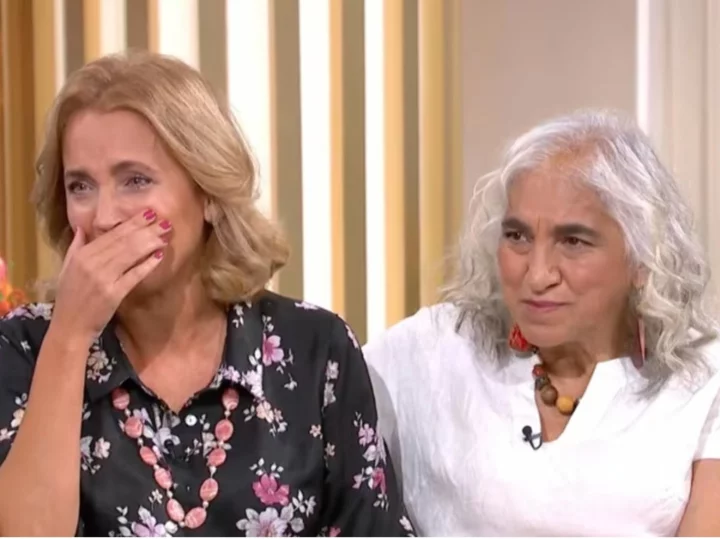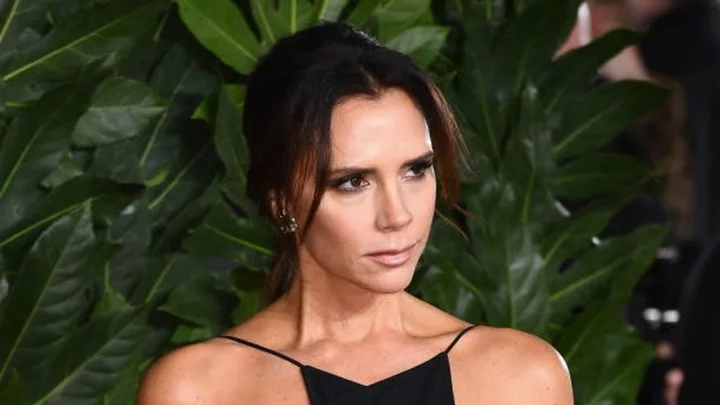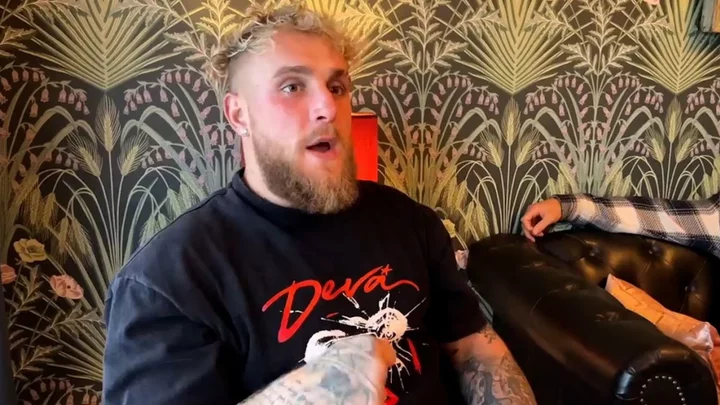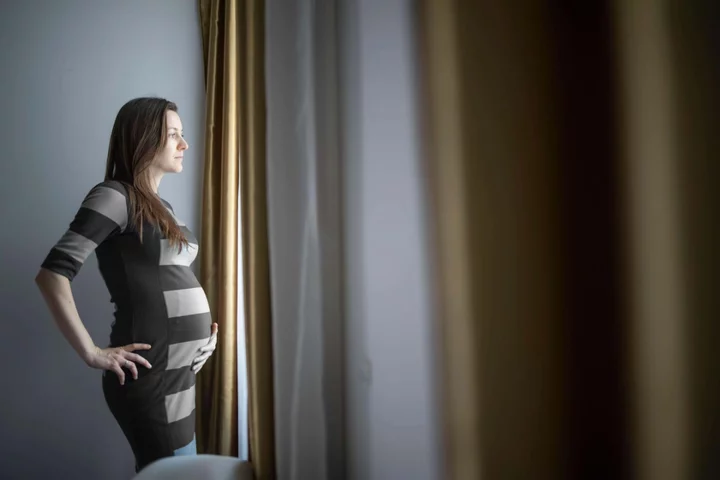
Chris Pratt sparks debate over when parents should throw away childhood trophies
Chris Pratt has asked the question almost every parent wonders when raising their children: Is it okay to throw away childhood trophies? The Guardians of the Galaxy star, 44, recently posed the question to his social media followers after he and his wife, Katherine Schwarzenegger, came across all her childhood trophies kept by her parents, Arnold Schwarzenegger and Maria Shriver. Pratt took to Instagram on 24 October, where he shared several photos of the children’s book author, 33, holding up some of her many childhood trophies - including “Problem Solving Super Star 4th Grade 2000” and “most improved two-year-old in swim class”. In the lengthy caption, the Parks and Recreation alum explained that Schwarzenegger’s mother had been “storing special items” from her daughter’s childhood for years, which he noted was “so very thoughtful”. “To see my darling wife beaming with sentiment as she opens these crates of meticulously organised keepsakes, remembering her cherished youth, makes me grateful for the efforts her folks put into archiving,” Pratt wrote. “I suppose that’s the payoff for the work it took to store this stuff, the smile on her face as she relives moments of her youth. To pray one day that your children will look back on their childhood with glee is a blessing. It is the hope of parenthood.” However, as the couple - who have been married since 2019 - perused Schwarzenegger’s prized possessions, it got him thinking about how long he’s supposed to hold onto his own children’s mementos. Pratt shares an 11-year-old son, Jack, with ex-wife Anna Faris and two daughters - Lyla, three, and Eloise, one - with Schwarzenegger. “Real talk,” Pratt said. “Once your kid goes through the stuff, is it okay to toss? I mean… do we need the ‘I was on a sports team trophy?’ Can they be donated? Repurposed? How many do we gotta keep? Not all of them right? Any of them? Is there a grading scale? Like, did you win? Were you a champion? Is there a specific sentimental connection? Help me out here. Do they go back in storage?” His relatable question prompted many parents in the comments section to sound off on how long they’ve kept their children’s trophies. Some users admitted that they wished their own parents had held onto their accolades for so long. “Wait this is amazing. I’ll be saving my children’s stuff for sure,” one person commented. “Well, I have no keepsakes from childhood and I wish I did. So there is that,” another said. “I had my boys go through their boxes and they kept what was special to them. I tossed the rest,” a third fan wrote. “FREEDOM!!!” Others revealed what they did to cherish their children’s precious memories while still saving some room in the storage bin. “I donated all my old trophies to an organisation that removes the labels and repurposes them for fun awards,” wrote one fan. “For those sentimental ones, we peeled off the engraved part and kept it in a plastic pocket notebook and tossed the trophy part,” said someone else. Another user suggested: “Give them out as prizes when your friends come over for game night.” Meanwhile, Schwarzenegger joked that her husband was simply jealous she’s acquired so many trophies over the years. “Feels like someone is a litttlllee bit jealous of my natural athleticism from birth and ability to solve problems,” she commented. Pratt’s mother-in-law also weighed in on the debate, as she applauded herself for saving almost every prized possession for her four children. “Omg I’m so happy,” Shriver commented. “Here’s to story trophies and school work and dresses and party outfits I feel vindicated.” The Jurassic World star was married to Faris in 2009. The former couple announced their split in August 2017 and finalised their divorce in October 2018, four months after he began dating Schwarzenegger. He proposed to the author in January 2019 and they were married in June that year. Pratt has often shared glimpses into his life as a father of three on social media. Most recently, he went viral when he posted a photo of the glittery makeover he received from his two daughters. He shared two photos of his new look, including one where his forehead was bedazzled with teal, purple, and silver gems. The other photo showed Pratt with pearl-like gems dotting his face, as well as a teal manicure. “All I have to say is… Jack would never do this to me,” he captioned the post. Read More Gym maths: How to optimise 22 minutes exercise a day according to fitness experts Jasmine Harman tearfully recalls mother’s struggles with hoarding Neglecting women’s health at work could cost UK economy £20.2bn a year – analysis Gym maths: How to optimise 22 minutes exercise a day according to fitness experts Jasmine Harman tearfully recalls mother’s struggles with hoarding Neglecting women’s health at work could cost UK economy £20.2bn a year – analysis
2023-10-25 22:52

Crystal Palace vs Tottenham - Premier League: TV channel, team news, lineups and prediction
Crystal Palace host Tottenham in the Premier League on Friday. Previews includes team news, predicted lineups, how to watch on TV and live stream and more.
2023-10-25 22:48

Sam Bankman-Fried will testify at criminal trial, lawyer says
NEW YORK FTX cryptocurrency exchange founder Sam Bankman-Fried plans to testify in his own defense at his criminal
2023-10-25 22:46

First pitch: 3 bold predictions for the 2023 World Series no one saw coming
The Arizona Diamondbacks and Texas Rangers will battle for the 2023 World Series title, and here's a look into the crystal ball ahead of Friday's Game 1 in Arlington.
2023-10-25 22:15

Jasmine Harman tearfully recalls mother’s struggles with hoarding
TV presenter Jasmine Harman became emotional as she opened up about her mother’s struggles with hoarding – and how it adversely impacted their relationship for years. The host of Channel 4’s A Place in the Sun, Harman, 47, said she “refused to bring people home” and was “really, really embarrassed and ashamed” about her mum Vasoulla’s condition, on Wednesday (25 October) during an appearance on This Morning. “In fact, when I started working in television, it was my biggest fear that someone would find out about the way I’d grown up and the way that we lived at the time,” she told Dermot O’Leary and Allison Hammond. Reflecting on how things had changed since then, Harman teared up as she affirmed her priority is “having a loving relationship” with Vasoulla – and not “focussing on the hoarding” anymore. Addressing her mother, Harman added: “She’s helped me to become a much more compassionate person. We used to fight, didn’t we? “But now we have a relationship that’s outside [of the hoarding].” Hoarding was recognised as a mental health disorder in 2013. According to the World Health Organisation (WHO), it is characterised by “an accumulation of possessions due to excessive acquisition of, or difficulty discarding possessions, regardless of their actual value”. The Diagnostic and Statistical Manual of Mental Disorders (DSM) outlines detailed criteria that psychologists can use to diagnose hoarding, including cluttered living spaces where the room’s intended use [of cooking, sleeping, or sleeping] has become impossible. These behaviours usually appear during a person’s early life, with Vasoulla explaining it was triggered by “the trauma of loss” in her case. “We moved from Cyprus when I was about three so I left my baby things back home and started collecting trinkets in bombed-out houses that were still about in the early Sixties, after the war – trinkets that I treasured,” she explained. “Then we moved back to Cyprus for a couple of years and those things all got lost. Then we moved back to England and all my new ties got lost – so I just had lots of upheaval, lots of loss.” Vasoulla, whose father was killed in Cyprus, added: “It’s more the loss, like a bereavement. Losing your father is a big thing, moving country ...you lose everything and you get a new place to live. The trauma of loss [is] something that a lot of people have as the onset of their hoarding behaviour.” The mother-daughter duo previously opened up about how hoarding affected their lives in a 2011 BBC documentary, titled My Hoarder Mum & Me. Speaking about the “cathartic experience”, Harman on Wednesday confessed:“I genuinely had no idea how many people were affected by this.” Around three million people are reportedly impacted by the mental health condition, according to Hoarding Disorders UK. The organisation’s director Jo Cook, who joined Vasoulla and Harman on the This Morning couch, explained that hoarding is neither a lifestyle choice, nor “about poor housekeeping”. When asked about supporting loved ones who might struggle with hoarding, Cook recommended joining a support group and approaching the anxiety-based disorder with empathy. “It’s really important that that person that you’re helping, feels safe in their home with you. Because, essentially, you’re unpicking someone’s nest, so you need to make sure you’re doing it slowly and surely,” she added. If you have been affected by this article, you can contact the following organisations for support: actiononaddiction.org.uk, mind.org.uk, nhs.uk/livewell/mentalhealth, mentalhealth.org.uk. Read More Pete Davidson is on the market for a hot date - but not for him Gym math: How to optimise 22 minutes exercise a day according to fitness experts Neglecting women’s health at work could cost UK economy £20.2bn a year – analysis Gym math: How to optimise 22 minutes exercise a day according to fitness experts Neglecting women’s health at work could cost UK economy £20.2bn a year – analysis Nearly three-quarters of mothers feel invisible, study suggests
2023-10-25 21:51

Everything Aaron Nola has said about Phillies free agency
Did Aaron Nola pitch his final game for the Philadelphia Phillies on Tuesday? The star pitcher heads to free agency this offseason.
2023-10-25 21:49

Montage of noughties interviews sums up why Millenials have such bad body issues
The harrowing revelations in Britney Spears’s new memoir are an uncomfortable reminder of how women were treated in the ‘90s and noughties. Objectification, ridicule and “slut”-shaming were a core part of the so-called lads culture that shaped so much of popular culture at the time. Now, anyone thinking, “It can’t have been that bad,” should take a look at a video montage that’s been doing the rounds on social media. The one-minute clip was shared by fitness influencer Hayley Madigan earlier this month, with the caption: “POV: You grew up in the 90’s and now realise why your relationship with your body was so bad…” The round-up begins with an excerpt from an interview between Dutch TV presenter Ivo Niehe and a 17-year-old Britney. Somewhat breathlessly, he tells her: “Everyone’s talking about it…” prompting the teenager to innocently ask: “What?” “Well, he replies, your breasts.” It then cuts to American radio star Howard Stern telling former Playboy model Anna Nicole Smith: “The way you dress and stuff, I don’t think you’re aware that you’re a heavy-set woman.” “I know I’m a big woman, so what?” she replies. He then tells her he’s been “guessing her weight” and asks her to step on some scales to check how well he did. We then see Scott Disick telling Kourtney Kardashian: “If I would have fallen in love with you a couple pounds overweight (sic), this would be my ideal weight, but I fell in love with you when you were super skinny." Next, it’s the turn of Simon Cowell, who tells an X Factor contestant that she “sounds nice but looks like a shop girl.” Clarifying, she says: “I’m overweight, basically,” to which he responds: “You really are.” Speaking of weight (and people did, a lot), we’re then treated to a clip from the now-axed Channel 4 show TFI Friday. The segment, from 1999, was filmed just two months after Victoria Beckham gave birth to her first son Brooklyn. After asking her how she got back into shape after the birth, host Chris Evans then asks if her weight was now “back to normal”. She tells him that “it is”, but he’s not satisfied. “Can I check?” he then asks, jumping from his seat and leading her to a set of bathroom scales. The penultimate excerpt is taken from a Jay Leno monologue, in which he tells viewers of his Tonight Show: “Monica Lewinsky said that President Clinton would often compliment her on her figure. “He would say things like, ‘Oh, you look skinny today.’” Pausing, Leno then doled out his punchline, saying: “You know, if you didn’t think this guy was the biggest liar in the world before…” which was met with peals of laughter from his audience. Finally, another scene from Keeping Up With the Kardashians, in which Bruce (now Caitlin) Jenner, tells his step-daughter Khloé: “I’ll get shot for bringing this up but don’t you think you should lose a few pounds?” Shaking her head dejectedly, she simply replies: “What?” The compilation racked up more than 5.4 million views and 200,000 likes in just three weeks on Madigan’s Instagram alone. In a statement accompanying the reel, the self-styled “female empowerment” guru wrote: “Whether it was in magazines, on talk shows or on reality TV… we continuously watched women get criticised. “We watched men talk negatively about women’s appearances, about their weight, about their body autonomy… and this complete disregard for women’s dignity forced a societal pressure amongst many of us who were growing up watching it.” Reflecting on her own response, she went on: “I constantly compared myself even at the young age of 12 I remember wanting to be as skinny as possible like the models on the TV. I had no desire to be anything but exactly what they looked like and I deemed them to be perfect. “I constantly heard negative opinions about women who weren’t perfect, women who weren’t small and women who didn’t fit the ideal stereotype that men created.” Wrapping up her message, she continued: “Seeing these talk shows and reality TV clips hits hard, women weren’t treated equally, we were continuously degraded and this put pressure on all of us growing up.” Then, concluding on a note of optimism, she added: “We’ve still not got to where we want to be but I feel somewhat change is happening and we will make sure the generations to come don’t endure the same pressure and issues we faced back then.” Commentators were quick to share their horror at the montage, with many condemning what they termed “male audacity” at the time. Others agreed with Madigan that it highlighted how far we’ve come in addressing such behaviours. “People often say ‘you can’t even say xyz anymore these days’,“ one wrote. “I think this video is a great testament that that is actually a positive development.” Sign up for our free Indy100 weekly newsletter Have your say in our news democracy. Click the upvote icon at the top of the page to help raise this article through the indy100 rankings
2023-10-25 20:59

Jake Paul explains why people thought he was taking cocaine at brother's boxing match
Jake Paul has responded to allegations that he was taking cocaine at his brother's recent boxing match against Tommy Fury. In a 16-minute YouTube video dedicated to the claims, the influencer played up to the storyline, planting Coca Cola in the frame and throwing white powder around. However, he maintains that drugs didn't play any part in his behaviour at the fight. "Everyone knows I'm the most sweatiest person in the world", he joked, adding that getting in the ring with his sweaty brother didn't help the situation. Instead, he says he's more of a 'mushrooms and wine' aficionado. Sign up to our free Indy100 weekly newsletter
2023-10-25 20:55

Kurt Cobain's daughter has married Tony Hawk's son in the best 90s crossover ever
Kurt Cobain's daughter and Tony Hawk's son have reportedly tied the knot, bringing together two iconic families of the 90s. Frances Bean Cobain, 31, and Riley Hawk, 30, got a marriage license back in September in San Diego County, Los Angeles, according to documents obtained by TMZ. The big day took place on October 7, and the couple had former R.E.M. frontman Michael Stipe, a friend of Kurt Cobain, perform at the ceremony. The relationship between the couple began in 2022 and was confirmed by Cobain after she posted a series of photos on Instagram after taking a year-long break from social media. One snap was of herself cuddled with the professional skateboarder, alongside Tony and his wife, Catherine Goodman. In another image, Riley smiled at the camera while holding a dog dressed in a Christmas-themed costume. "I took a year-long break from posting on Instagram which was exceptionally good for my mental, emotional & spiritual health," Frances wrote in the post. "2021 brought me more into the present moment than I've ever been, which I'm deeply grateful for." Frances was previously married to musician Isaiah Silva in 2014 but the couple divorced in 2016. News of the relationship and now marriage between Frances - the daughter of the Nirvana frontman - and Hawk - the son of the most famous skateboarder of all time - has delighted fans. Congrats to the happy couple! How to join the indy100's free WhatsApp channel https://www.indy100.com/news/indy100-news-updates-... Sign up to our free Indy100 weekly newsletter Have your say in our news democracy. Click the upvote icon at the top of the page to help raise this article through the indy100 rankings.
2023-10-25 20:49

Neglecting women’s health at work could cost UK economy £20.2bn a year – analysis
Neglecting women’s health in the workplace could be costing the UK economy around £20.2 billion each year, analysis has suggested. In a new survey of 2,000 women, 68% said that they have dealt with health issues at some point in their career, whilst almost 29% felt their employers were not supportive. When factoring in specific health matters that relate to women, including endometriosis, fertility, menopause and periods, this figure increases to 36%, leaving 46% of women worried that their health could impact their career trajectory and 48% thinking they would be forced to resign. The study conducted by AXA Health in partnership with the Centre of Economics and Business Research (CEBR) also suggested that 83% of women have had their personal finances affected when faced with health issues. For instance, 52% of women have had to take time off, 22% missed out on a promotion and 20% settled for lower pay. Economic modelling from AXA Health and CEBR suggested that ignoring women’s health at work could be costing the UK economy £20.2 billion a year. From 90% of women struggling emotionally, 46% feeling helpless and 43% feeling less motivated at work, this issue has also had a huge impact on their mental health and wellbeing. “As this report finds, neglecting the health of women in our workplaces isn’t just a matter of compassion; it’s a serious economic oversight,” said Flick Drummond MP, who is serving as the co-chair of the All-Party Parliamentary Group on Women and Work. Dr Pallavi Bradshaw, deputy chief medical officer at AXA Health, added: “While companies certainly still have a way to go in addressing women’s health at work, there is promise in the increased willingness of women to discuss their health concerns with colleagues and managers.. “For example, our women’s health report found that 60% of women who talked about their health found their employers to be supportive, whether this be through time off, offering counselling or making adaptations to the workplace. “These developments are positive, but as we delve further into the findings, it becomes evident that concerns extend beyond just health issues. A striking 53% of the women we surveyed voiced that, within their workplaces, women often shoulder more unplanned responsibilities – such as caring for loved ones – than their male counterparts. “Furthermore, when reflecting on their own families, 39% of respondents revealed that they bear a greater burden than male family members when it came to unexpected caring responsibilities. This gender-based imbalance in unpaid labour not only perpetuates inequality but also places women at risk of being sidelined in their careers, overlooked for promotions, or compelled to work beneath their true potential.” Bradshaw said the economic impact of neglecting women’s health is “still significant”, and urged the need for “more education, robust workplace policies and talent retention initiatives”. The report suggested women who work part-time are hit even harder when it comes to health-related issues. It found that 61% are worried about having to leave their jobs prematurely, which exceeds the average by 19%. Only 17% of women who work full-time believe that conversations surrounding women’s health are not encouraged in their workplaces, but this increases to 23% for those who are employed part-time. According to a report conducted by The Royal College of Obstetricians and Gynaecologists, women represent 51% of the population and 47% of the workforce. Read More Nearly three-quarters of mothers feel invisible, study suggests The best ways to work-out in 22 minutes – as study finds this is magic number for offsetting ‘negative impact of sitting’ What crops will we be growing in the future, as climate change alters the landscape? As Rebecca Adlington shares heart-breaking miscarriage news: How to support others experiencing baby loss What you need to know about new research into treating cervical cancer How to do Halloween make up and still take care of your skin
2023-10-25 19:49

Archaeologists reveal face of Peru's 'Ice Maiden' mummy
Experts have reconstructed the face of the 'Ice Maiden', an Inca girl sacrificed in the Andes
2023-10-25 19:48

Nearly three-quarters of mothers feel invisible, study suggests
Most women feel ‘invisible’ and ‘unappreciated’ when they become mothers, new research has revealed. Instead of ‘having it all’, 72% of mums feel invisible and 93% feel unappreciated, unacknowledged or unseen once they’ve had children. Another 93% said that since having a child, their identity has been reduced to only being a mother. And the weight of expectation is huge, too, with 97% of mums questioned in the survey by the online motherhood community Peanut saying pressure is put on them to ‘do it all and be it all’. Plus, 94% believe they’re expected to put themselves last and self-sacrifice for their families, partners, jobs, and other responsibilities, so they can achieve what they feel is required of them. Nearly half of mums (46%) said they don’t feel supported by the healthcare system after giving birth, and 70% expected more support from society in general. As a result of this lack of support and invisibility, most women surveyed (95%) agreed there’s an impact on their mental health and wellbeing, with 86% having experienced anxiety, 82% feeling stressed, burned out or exhausted, and 80% feeling overwhelmed, or lonely and isolated. Other strong feelings identified by mums included irritability (78%), loss of identity (65%), feeling judged (66%), feeling unsupported (64%), guilt (63%), depression (55%), resentment (54%), worthlessness (50%), and neglect (24%). Women attributed the things making them feel invisible to unfair division of labour in the home, trying to juggle a career and childcare, lack of empathy and understanding from both family and everyone else, gaps in healthcare and mental health support, identity and independence struggles, hiding the pain of pregnancy loss, and general pressure from healthcare, education institutions and the media. Commenting on the findings, psychologist Dr Rachel Goldman said: “The invisibility of motherhood is a stark reality many face. The journey begins with frequent visits to healthcare providers, but once the child arrives, there’s a sudden gap, creating a sense of abandonment. Women grapple with overwhelming feelings of exhaustion and stress, only to confront rushed appointments where healthcare professionals don’t have time to adequately dive into concerns.” As a result of the research, Peanut has launched an Invisible Mothers campaign, featuring a State of Invisibility report, to draw attention to mums’ struggles and highlight ways to make them more visible and better supported. The report found mums think more empathy and gender equality will help them feel more visible, with 82% calling for flexible, family-friendly workplaces, 77% wanting equal and extended leave for both parents, and 71% saying an equal share of parenting tasks would help. Additional measures that will help mums, says Peanut, include more public toilets having changing facilities, additional resources for mental health support, support groups for both parents, and educational initiatives about gender stereotypes. The report also identified the most common unwanted questions that contribute to mothers’ feelings of invisibility, with alternative suggestions that women say they would prefer to hear. So instead of asking ‘How’s the baby?’, Peanut suggests mums are asked ‘How are you really – mentally, emotionally and physically?’, and rather than ‘Was the pregnancy planned?’, try ‘Are you excited?’, and change ‘How do you do it all?’ to ‘How’s the mental load?’. Goldman added: “It doesn’t take grand gestures to offer support. A genuine ‘how are you’ or ‘thinking of you’ can significantly shift perceptions, signalling to someone that they matter. Small changes or actions, like compassionate conversations, can have profound impacts. “By acknowledging and addressing these issues, we can begin to truly support motherhood.” Read More The best ways to work-out in 22 minutes – as study finds this is magic number for offsetting ‘negative impact of sitting’ What crops will we be growing in the future, as climate change alters the landscape? As Rebecca Adlington shares heart-breaking miscarriage news: How to support others experiencing baby loss What you need to know about new research into treating cervical cancer How to do Halloween make up and still take care of your skin Which houseplants best suit your star sign?
2023-10-25 19:29
